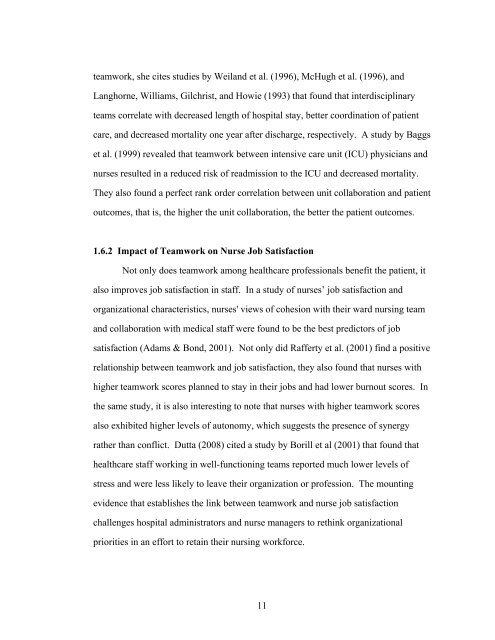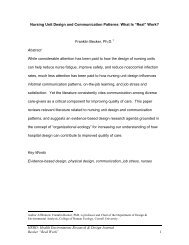The role of physical design and informal communication
The role of physical design and informal communication
The role of physical design and informal communication
You also want an ePaper? Increase the reach of your titles
YUMPU automatically turns print PDFs into web optimized ePapers that Google loves.
teamwork, she cites studies by Weil<strong>and</strong> et al. (1996), McHugh et al. (1996), <strong>and</strong><br />
Langhorne, Williams, Gilchrist, <strong>and</strong> Howie (1993) that found that interdisciplinary<br />
teams correlate with decreased length <strong>of</strong> hospital stay, better coordination <strong>of</strong> patient<br />
care, <strong>and</strong> decreased mortality one year after discharge, respectively. A study by Baggs<br />
et al. (1999) revealed that teamwork between intensive care unit (ICU) physicians <strong>and</strong><br />
nurses resulted in a reduced risk <strong>of</strong> readmission to the ICU <strong>and</strong> decreased mortality.<br />
<strong>The</strong>y also found a perfect rank order correlation between unit collaboration <strong>and</strong> patient<br />
outcomes, that is, the higher the unit collaboration, the better the patient outcomes.<br />
1.6.2 Impact <strong>of</strong> Teamwork on Nurse Job Satisfaction<br />
Not only does teamwork among healthcare pr<strong>of</strong>essionals benefit the patient, it<br />
also improves job satisfaction in staff. In a study <strong>of</strong> nurses’ job satisfaction <strong>and</strong><br />
organizational characteristics, nurses' views <strong>of</strong> cohesion with their ward nursing team<br />
<strong>and</strong> collaboration with medical staff were found to be the best predictors <strong>of</strong> job<br />
satisfaction (Adams & Bond, 2001). Not only did Rafferty et al. (2001) find a positive<br />
relationship between teamwork <strong>and</strong> job satisfaction, they also found that nurses with<br />
higher teamwork scores planned to stay in their jobs <strong>and</strong> had lower burnout scores. In<br />
the same study, it is also interesting to note that nurses with higher teamwork scores<br />
also exhibited higher levels <strong>of</strong> autonomy, which suggests the presence <strong>of</strong> synergy<br />
rather than conflict. Dutta (2008) cited a study by Borill et al (2001) that found that<br />
healthcare staff working in well-functioning teams reported much lower levels <strong>of</strong><br />
stress <strong>and</strong> were less likely to leave their organization or pr<strong>of</strong>ession. <strong>The</strong> mounting<br />
evidence that establishes the link between teamwork <strong>and</strong> nurse job satisfaction<br />
challenges hospital administrators <strong>and</strong> nurse managers to rethink organizational<br />
priorities in an effort to retain their nursing workforce.<br />
11







